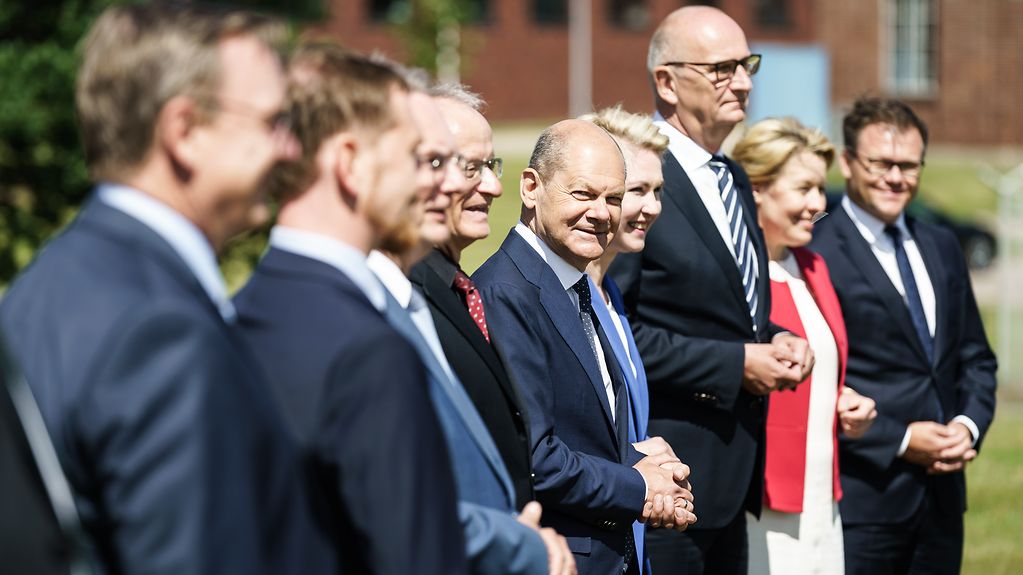State Premiers’ Conference for the eastern federal states
Federal Chancellor Olaf Scholz and the Heads of Government of the Länder of eastern Germany met for their regional conference on the island of Riems. It was agreed that an agency would be set up to represent East German interests in connection with hydrogen research and that a conference entitled “Skilled workers offensive for eastern Germany” would be held in the autumn. In their Riems declaration, the Länder of eastern Germany express their will to be independent of Russian energy sources.
2 min reading time

Federal Chancellor Scholz and the Heads of Government of the Länder of eastern Germany met on the island of Riems, north of Greifswald.
Photo: Federal Germany/Denzel
The venue chosen for the meeting between the state premiers of the Länder in eastern Germany and Federal Chancellor Olaf Scholz was the Federal Institute for Animal Health – the Friedrich Loeffler Institute on the island of Riems. As state premier Manuela Schwesig said, there was a good reason for this choice, seeing that the institute is a key player in virus research in Germany. What is more, she said, it was a good example of a German research institution that had been established in the eastern part of the country.
The institute on the island of Riems was founded by Friedrich Loeffler in 1910 at the direction of the Prussian Ministry of Culture with the aim of conducting research into foot-and-mouth disease. The institute continued its work until 1991. On 1 January 1992, it was re-established as part of the Federal Research Institute for Viral Diseases of Animals. In June 2004, the latter was renamed the Friedrich Loeffler Institute (FLI) with the additional designation “Federal Research Institute for Animal Health”. Today, the FLI comprises 12 specialised institutes at five sites.
Benefiting from the experience of East Germans
The Federal Chancellor said that the talks with the Heads of Government of the Länder of eastern Germany had been open and constructive. “The citizens of eastern Germany are experts when it comes to transformation,” said Scholz. Everyone could benefit from their experience and attitude, said the Federal Chancellor after the traditional meeting of state premiers of the Länder in eastern Germany.
The energy transition in connection with the Ukraine war was a particular challenge for eastern Germany, said Scholz, something that the Federal Government was monitoring very closely. Citizens in the east of the country were also benefiting from the Federal Government’s relief packages and the statutory minimum wage of 12 euros. It was now important for the Federal Government and the Länder to cooperate and agree on common goals so as to be able to pool their capabilities, she stressed.
Eastern Germany: a region of the future
State premier Schwesig summarised the results of the meeting: a coordination agency is to be set up in Berlin to jointly represent the interests of the Länder in eastern Germany with regard to hydrogen research. The Federal Government is to provide start-up funding for this purpose.
In autumn, the Länder are planning a joint conference entitled “Skilled workers offensive for eastern Germany”.
In their Riems Declaration PDF, 196 KB, not barrier-free (only German), the East German federal states agreed to become independent of Russian energy sources and accelerate the expansion of renewable energies.
Other topics of discussion included improved medical care for citizens close to home and relief for low-income earners and pensioners.